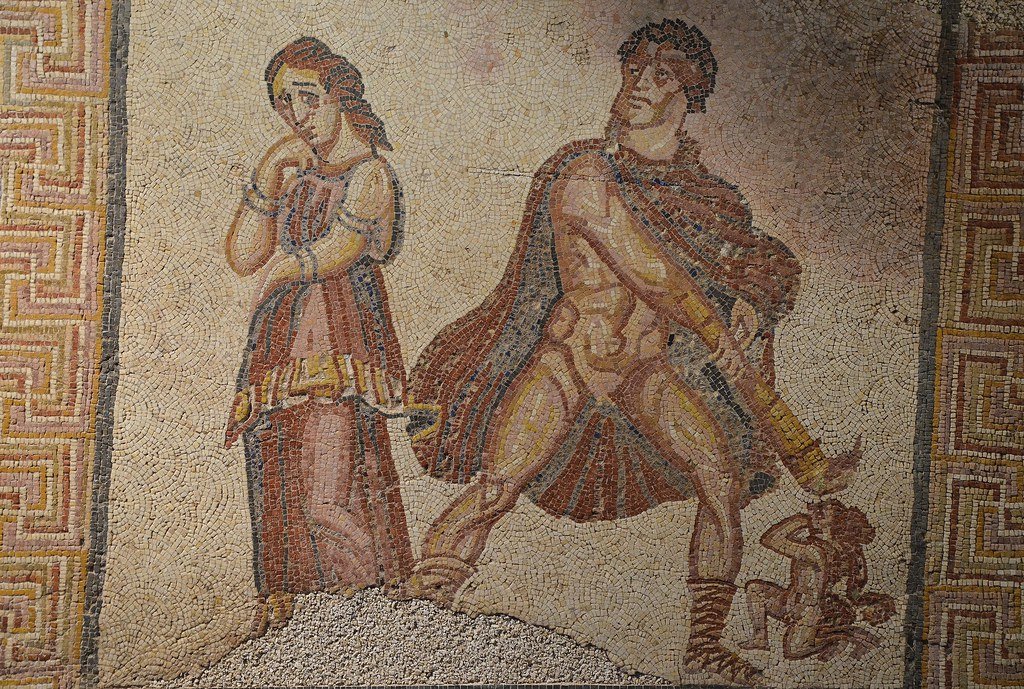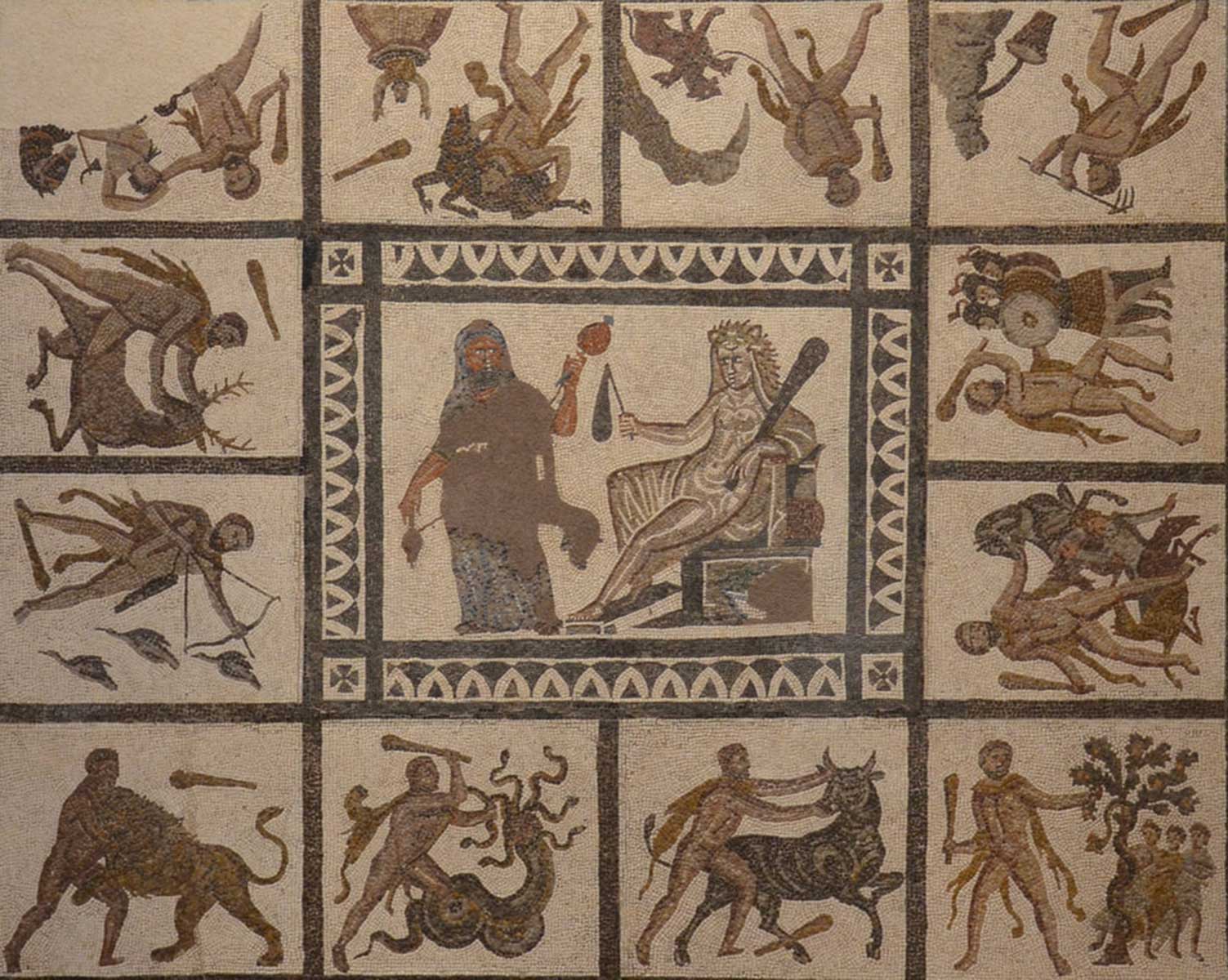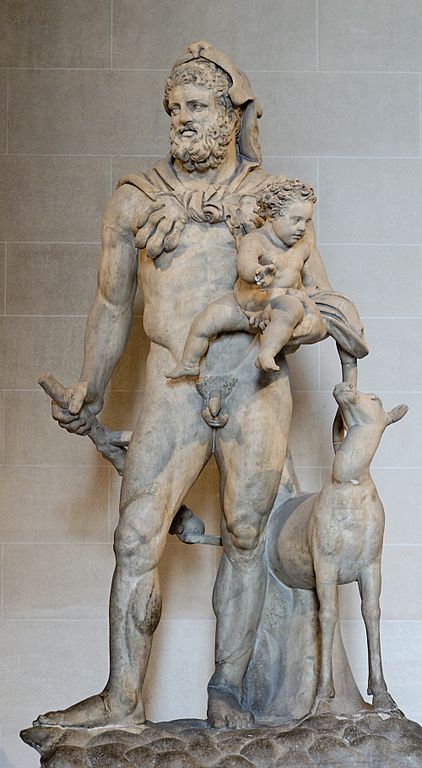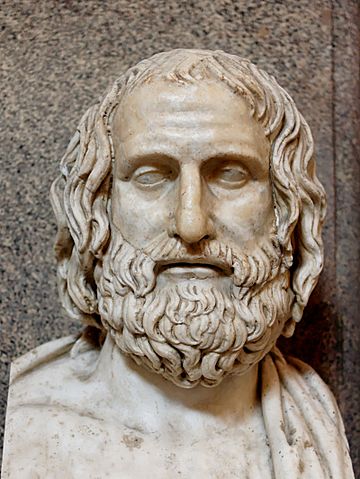
Heracles
Heracles by Euripides
The second of two surviving tragedies by Euripides where Heracles’ family are suppliants—the first one being Children of Heracles—Heracles (also known as The Madness of Heracles) was first produced for the Great Dionysia shortly before 415 BC. The play begins sometime after Heracles has married Megara, the daughter of the king of Thebes, Creon, and has gone to perform his famous Twelve Labors. In the meantime, Lycus (“Wolf”) has usurped the throne of Thebes and is now preparing to kill Megara and Heracles’ sons. Joined by her children and Heracles’ stepfather, Amphitryon, Megara looks for temporary sanctuary at the palace of Heracles at Thebes; at the beginning of the play, the five pray for help from Zeus at his altar there. Their wishes are heard: soon after, having completed the last of his Labors, Heracles returns from his travels and wastes little time before killing Lycus. Unfortunately, the gods—more precisely, Hera who has hated Heracles ever since his birth—are not that fond of this happy ending; and they decide to take the matters into their own hands. This is what Iris (messenger of the gods) announces from the palace roof, appearing swiftly and all of a sudden. She incites Lyssa (Madness) to attack Heracles and infest him with frenzy, and Lyssa does precisely that—even though against her own will. Before too long, a messenger arrives to reveal that Heracles has gone mad and has murdered his wife and his children. With the help of Amphitryon, Heracles returns to sanity only to be maddened with grief over his actions. At the end of the play, Theseus, Heracles’ faithful friend, arrives from Athens and takes the wounded hero to his town in hope to find a way to comfort him and soothe his immense pain.
Date and Historical Background
Even though no traditional date of Heracles has come down to us from ancient scholars, based on metrical evidence, the play was probably first performed in 416 or 415 BC, somewhat later than Electra, but certainly a little earlier than The Trojan Women. Antiquity has recorded a tradition that Euripides was prosecuted by fifth-century Athenian statesmen Cleon for showing Heracles going mad in a play at the Dionysia—but this, quite probably, is not true.
Characters and Setting
Characters
• Amphitryon, Heracles’ foster father, husband of his mother Alcmena
• Megara, Heracles’ wife, daughter of Creon
• Heracles, son of Zeus and Alcmena, foster son of Amphitryon
• Lycus, tyrant (unlawful king) of Thebes
• Iris, messenger of the gods
• Lyssa, Madness personified
• Messenger
• Theseus, king of Athens
• Chorus of Theban elders
Setting
The play is set outside the palace of Heracles at Thebes; there is an altar dedicated to Zeus the Savior, on the steps of which Amphitryon, Megara, and Heracles’ three sons sit as suppliants.
Summary of Heracles
Prologue
On the steps of the altar of Zeus before the palace of Heracles in Thebes, the members of Heracles’ closest family are seated in dread and in pursuit of refuge: Amphitryon, his foster-father, Megara, his wife, and the couple’s three sons. The play starts with a monologue by Amphitryon which outlines Heracles’ double parentage—son of Zeus and Alcmena—and reveals that his wife, Megara, is a Theban princess, daughter of the country’s king Creon. Not long ago, a tyrant named Lycus has seized power from Creon and, afraid of revenge, is now “bent on extirpating the children of Heracles,” on top of getting rid of Megara and Amphitryon themselves. Unfortunately, Heracles can’t help his family at the moment, because he is away performing his labors—more precisely, his last labor in the Underworld. What’s worse, in his misfortune (as one often does), Amphitryon has learned that he has never had reliable (or, at least, powerful) friends as well, so the family is left entirely on its own in these dire times.
Megara overhears Amphitryon and, in the ensuing discussion, shares with him her fears and dilemmas. She asks her father-in-law for some advice, revealing to him that he is her only remaining hope. Though aware that the five are “powerless to escape,” Amphitryon is still hopeful that Heracles will return in time to save them, and instructs Megara to tell a similar story to her children to comfort them. “The bravest man is he who relies ever on his hopes,” he concludes, “but despair is the mark of a coward.”
Parodos (Entrance Song)
At this point, the Chorus of Old Men of Thebes arrives before the Temple of Heracles to express its sympathy and solidarity with the unfortunate family, while also lamenting its own ill health and utter inability to help. Barely are they finished with their speech, when their leader notices Lycus, the new ruler of Thebes, drawing near the house.
First Episode
Followed by his attendants, Lycus, the murderer of Creon and usurper of his throne, arrives before the temple and immediately, without no intro whatsoever, asks Amphitryon and Megara how long they intend to prolong their lives. “What hope,” he goes on, “what aid do you see to save you from death? Do you trust that these children's father, who lies dead in the halls of Hades, will return?” The question serves merely as a starting point for a longer and bitter invective against Heracles’ arete (or: heroic valor), which Lycus feels that the great hero lacks, because instead of facing the sword and the spear, he has won his renown by killing his enemies from afar with a bow, the “coward's weapon.” “Archery is no test of manly bravery,” concludes Lycus.
Expectedly, Amphitryon offers reasons for the opposite: in yet another of Euripides’ numerous attempts to redefine heroism via intelligence, Heracles’ foster father claims that the real hero is not one who allows being “slave to his weapons,” but someone who has found a way to use them to enhance his chances to win a battle. A broken spear spells death for someone who fights in a line, but the archer has time to reload because he fights his enemies from distance, protected by his friends from the army. Using a bow is, Amphitryon says, “by far the wisest course in battle, to harm the enemy and keep safe oneself, independent of chance.” Heracles is, consequently, a smart hero and not a coward—unlike Lycus who has appropriated someone else’s throne and now wants to murder innocent children in the absence of their father.
“Say what you will of me in your exalted phrase,” replies disinterestedly Lycus, “but I by deeds will make you rue those words.” Then he orders his attendants to pile wood on all sides around the altar so that the suppliants can be burned alive as soon as possible. He also threatens the Old Men who can do nothing but, yet again, burst into a lament for the fate of Heracles’ family and their inability to help them. They suggest to Megara that she takes her children and try to escape from Thebes, but Megara, thanking them for their support, replies that she intends to instead accept necessity and die nobly. “Whoever struggles hard to escape destiny sent by the gods shows zeal no doubt,” she says, “but it is zeal with a taint of folly; for what must be, no one will ever avail to alter.”
At the request of Megara, she and the children are permitted by Lycus to enter the palace to dress themselves “in the robes of death.” Amphitryon, left alone, curses Zeus for abandoning the family of his son. “Great god as you are,” he says impiously, “I, a mortal, surpass you in true worth. For I did not betray the children of Heracles.”
In the first stasimon (the second choral song), the Old Men of Thebes sing of Heracles and his famous labors, presuming that he hasn’t survived his last one, his visit of Hades' house of tears one of no return.
Second Episode
Amphitryon, Megara, and Heracles’ children all exit the palace, prepared to face their deaths. Despairing and hopeless, Megara bewails the fate of her children and fantasizes how glorious their lives might have been if Heracles had never left. “O my dearest Heracles,” she exclaims in tears, “to you I call, if perhaps mortal voice can make itself heard in Hades' halls; your father and children are dying, and I am doomed, I who once because of you was counted blessed as men count bliss. Come to our rescue; appear, I pray, if only as a phantom, since your arrival, even as a dream, would be enough, for they are cowards who are slaying your children.” Despite having just renounced him, Amphitryon prays to Zeus for any kind of help, even less hopeful than Megara that his prayers will fall on heedful ears.
But, strangely enough, they actually do: dressed in royal clothes and with a bow and a club in his hands, Heracles suddenly appears before the temple named after him and is startled to see his children dressed in the robes of death, surrounded by his wife and father weeping. Upon learning what has happened and informing, in passing, the curious Amphitryon all about his last labor in Hades—complete with a description of the murder of Cerberus and a footnote on the rescuing of Theseus—Heracles leads his children inside the palace and announces his intention to exact revenge on Lycus.
In the second stasimon, the Chorus celebrates the return of Heracles and joyfully sings in praise of his courage and the countless blessings of young age.
Third Episode
Lycus comes before the palace of Heracles but finds only Amphitryon there. He demands to know where Megara and the children are. Amphitryon tells him that they are praying at the altar of Zeus inside the palace but refuses to go to them and bring them outside—because, as he says, that way he should become an accomplice in their murder. Impatient and determined to get rid of them once and for all, Lycus goes inside the palace himself followed by his servants and Amphitryon. Soon after, cries of pain and woe reach the ears of the Theban elders standing before the palace: they conclude that Lycus has lived his last day on earth.
The old men rejoice in Heracles’ victory in the third stasimon of the play, thanking the gods for taking care to heed the right and wrong. As if summoned by their song, the specters of Iris, the messenger of the gods, and Lyssa, Madness incarnate, appear on the palace roof.
Fourth Episode
“We have not come to do your city any hurt,” says Iris to the perplexed Theban elders, “but our warfare is against the house of one man only, against him whom they call the son of Zeus and Alcmena.” Iris reveals that she has been sent by Hera to brand Heracles “with the guilt of shedding kindred blood by slaying his own children” and orders Lyssa to set the wheels of this infernal plan in motion. “Come then, unwed maid, child of black Night,” she says chillingly, “harden your heart relentlessly, send forth frenzy upon this man, confound his mind even to the slaying of his children, drive him, goad him wildly on his mad career, shake out the sails of death, that when he has conveyed over Acheron's ferry that fair group of children by his own murderous hand, he may learn to know how fiercely against him the wrath of Hera burns and may also experience mine; otherwise, if he should escape punishment, the gods will become as nothing, while man's power will grow.” Lyssa is reluctant to do Hera’s and Iris’ bidding, but eventually she acquiesces.
Soon after, Amphitryon can be heard moaning from inside the palace, and a Messenger storms out the door in tears and horror. Asked by the Chorus, the Messenger reveals what has happened in detail, covering everything from Heracles’ “madman’s laugh,” through his transformation into someone “no longer himself” to his methodical killing of his wife and sons, whom he had confused with members of “Eurystheus' brood” in his hallucinations. The madness was finally interrupted by the goddess Athena who hurled a rock against the breast of Heracles and sent him into a coma.
In the fourth stasimon, the Chorus compares Heracles’ actions with those of Procne and Danaus’ daughters and pronounces them even more terrible and less forgiving.
Exodos (Exit Song)
The central doors of the palace open only to reveal the sleeping Heracles, bound to a shattered column, and surrounded by the bodies of his wife and children. The Chorus and Amphitryon mourn the fate of both the dead and the living members of Heracles’ family, The old men even dare to ask an impious question: “O Zeus, why have you shown such savage hate against your own son and plunged him in this sea of troubles?”
It is at this point that Heracles awakes, perplexed and still hallucinating, wondering if he has come “a second time to Hades’ halls.” Afraid but compassionate, Amphitryon slowly guides his son out of his reveries and toward the dreadful realization of what he has done. “Ah, me!” cries out Heracles, “why do I spare my own life when I have become the murderer of my dear children? Shall I not hasten to leap from some sheer rock, or aim the sword against my heart and avenge my children's blood, or burn my body, which she drove mad, in the fire and so avert from my life the infamy which now awaits me?”
Heracles’ suicidal thoughts are interrupted by the arrival of Theseus, roused by the rumors that Lycus has usurped the throne of Thebes, and coming from Athens with an allied army to fight the tyrant. Ashamed and afraid that he’d pollute his friend, Heracles veils his head to remain unseen, but once Theseus learns from Amphitryon what has happened, he orders Heracles’ father to uncover him so that he can sympathize properly. Upon hearing out Heracles’ side of the story, Theseus offers him hospitality in Athens and comforts him by telling him that he has done no sin willingly and that sometimes even the gods do evil things such as “unholy unions” and yet none of them has been banished from Olympus.
“For my part,” Heracles answers famously, “I do not believe that the gods indulge in unholy unions; and as for putting bonds on hands, I have never thought that worthy of belief, nor will I now be so persuaded, nor again that one god is naturally lord and master of another. For the deity, if he be really such, has no wants; these are miserable tales of the poets.” However, Theseus’ friendship eventually convinces Heracles to refrain from committing suicide and he agrees to leave with him in Athens to seek purification and redemption. Forbidden by Theban laws to bury his wife and children (or even attend their funeral), he asks from Amphitryon and the Thebans to do that, and, leaning on Theseus, leaves the country. “With grief and many a bitter tear we go our way,” say mournfully the Theban elders at the end, “robbed of all we prized most dearly.”
A Brief Analysis
Criticized for being unbearably episodic and “dyptichal” ever since the early nineteenth century—A. C. Swinburne famously described it as “a shapeless and soulless abortion”—Heracles is nowadays often deemed “one of Euripides’ most innovative and powerful dramas” (Allan and Storey). True, as Kathleen Riley writes, the play’s action is “violently broken into two apparently discrete dramatic entities or movements” but these movements complement each other—precisely due to their incompatibility—in a daring and unprecedentedly Euripidean way.
As is obvious at first glance, the first of these movements, to quote Riley yet again, “is a familiar suppliant action, a rescue story culminating in belated but convincing confirmation of Providence;” the second, on the other hand, “inaugurated by a sinister central epiphany,” is anything but familiar and effectively “cancels the moral order which the first movement restored.” One would expect from a traditional Greek play of the fifth century to end with Heracles killing Lycus, an act that simultaneously attests to Heracles’ heroism and validates the benevolence of the gods. However, in more ways than one, this is where Euripides’ real tragedy begins: the gods (as it often happens in Euripides) turn out to be not the solution to humanity’s problems, but, in fact, their root cause, and mortals are preordained to write the grand human narrative not with their help, but despite their interference.
In Euripides’ opinion, as presented in Heracles, this grand narrative is primarily one of friendship, something only humans seem to appreciate. There is a reason why Heracles renounces his divine heritage, telling Amphitryon that he sees him, rather than Zeus, as his father: unlike gods, humans are capable of being compassionate and courageous enough to help even the ones disliked by the gods. We might be destined to suffer, says Euripides, but we have found a way to bear this unmerited suffering by being friendly and supportive of each other. Heracles doesn’t commit suicide at the end of the play because Theseus offers him a helping hand; and he expresses his gratitude in a way only a human can: “Bereft of my own sons, I find you as a son to me.”
More importantly, both through Heracles’ actions and his definite rejection of anthropomorphic gods as “miserable tales of the poets,” Euripides seems to redefine the essence of apotheosis, or deification, the heroic and human ideal for many centuries before. Humans don’t need to strive to become gods, he seems to say, because they are more divine than deities will ever be when they are humane, cooperative, and heroic.
Sources
There are many translations of Heracles available online, both in verse and in prose; if you are a fan of the latter, you can read E. P. Coleridge’s translation for Loeb Classical Library here. If, however, you prefer poetry, feel free to delve into Arthur S. Way blank verse adaptation here.
See Also: Euripides, Children of Heracles, Heracles, Labours of Heracles
Heracles Video
Heracles Associations
Link/Cite Heracles Page
Written by: The Editors of GreekMythology.com. GreekMythology.com editors write, review and revise subject areas in which they have extensive knowledge based on their working experience or advanced studies.
For MLA style citation use: GreekMythology.com, The Editors of Website. "Heracles". GreekMythology.com Website, 28 Nov. 2019, https://www.greekmythology.com/Plays/Euripides/Heracles/heracles.html. Accessed 26 April 2024.




